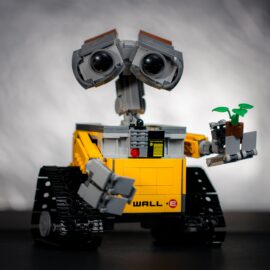

This article is an excerpt from the Shortform book guide to "Homo Deus" by Yuval Noah Harari. Shortform has the world's best summaries and analyses of books you should be reading.
Like this article? Sign up for a free trial here .
Are humans superior to animals? Do you think human superiority over animals in certain domains justifies the way we treat them?
People want to believe that they are fundamentally superior to animals and that this superiority justifies our dominance over and our treatment of animals. There are three main factors for this justification: our soul, consciousness, and self-awareness.
Keep reading for more about the alleged superiority of humans over animals and the real reason humans dominate the earth.
Human Superiority Over Animals
While there are imbalances between different races, ethnicities, and cultures, people typically believe that human life is superior and more sacred than animal life.
For example, an American citizen may have better access to healthcare, education, and civil liberties than an Afghani citizen, but this doesn’t mean that the American life is more valuable than the Afghani life. However, compare a human’s life to the life of a cow, and most people would argue that the human’s life is more valuable than the cow’s life.
Throughout history, people have pointed to three differentiating reasons for human superiority over animals: our soul, consciousness, and self-awareness.
The Human Soul
Most theistic religions point to a God-given soul as the justification for human superiority, giving people the freedom to abuse and slaughter animals for their own gain. However, despite searching extensively, modern science has found no evidence that people have a soul. In fact, theories such as Darwin’s theory of evolution directly contest its existence.
While theists believe that the soul is an independent entity that hasn’t changed throughout the course of human history, evolution implies that humans are changing all the time and aren’t capable of eternal characteristics. They’re made up of ever-evolving parts that interconnect with the rest of the body.
For example, the human eye consists of dozens of separate, intricate parts that have developed over thousands of years. Each part can be traced back through time to create an idea of how the eyeball evolved. The development of the eye can also, then, be connected to the evolution of the human body and the way that human senses have changed throughout history.
If the soul has no parts, isn’t connected to the physical body, and doesn’t change, it didn’t develop as a result of human evolution. Therefore, the likelihood of its existence is slim to none. Some claim that the human soul just “appeared” one day, but that creates a litany of other questions:
- Who was the first person with a soul?
- Were they born with it?
- If so, how did a baby suddenly develop a soul when neither of its parents had any evidence of one?
- If not, who gave the baby a soul?
The Human Consciousness
If they assume the soul is non-existent, people will then use consciousness as their justification for human superiority. Consciousness is the combination of thoughts, emotions, and sensations that create subjective experience. For example, if you watch someone trip and fall, you may feel concern for the person’s safety while another observer may find the situation humorous.
There is evidence that consciousness, unlike the soul, exists. Everyone has active thoughts, feels emotion, and experiences sensations. For example, if you step on a nail, you’ll likely feel pain along with shock, frustration, or anger.
There are two fundamental characteristics of consciousness: sensation and desire. Robots and computers carry out complex tasks but feel no sensations or cravings. Therefore, they don’t possess consciousness, which allows people to feel superior. However, unlike computers, animals do feel sensations and cravings similarly to humans. People know this but justify their dominance by claiming that animals experience a “lesser” consciousness.
Dating back to the 17th century, people have claimed that animals experience the world in a purely instinctual way. According to this argument, animals lack subjective experiences and, therefore, possess an inferior consciousness. Though this theory is popular, there is little evidence to support it.
In reality, scientists know little about consciousness, human or otherwise. Modern science suggests that consciousness is likely the result of electro-chemical reactions in the brain, but no one knows for sure how this translates into subjective experiences.
Some claim that, if consciousness can’t be explained, then perhaps the concept of consciousness needs to be discarded. However, this perspective ignores the validity of subjective experiences. For example, if someone’s assaulted, they’re going to have an emotional and subjective response to their experience. Negating consciousness as a whole denies their experience.
The most popular theory of the 21st century states that, while consciousness has moral and social importance, it’s likely just the byproduct of neural processes of the brain. Essentially, this equates consciousness to mental pollution. While this is a vague and poorly fleshed-out theory, it’s the best scientists have been able to come up with in the 21st century.
Human Consciousness Versus Computer Consciousness
People have no way of knowing how consciousness is created or if artificial intelligence will one day gain the power of consciousness. After all, if consciousness is truly the byproduct of neural pathways and electric currents in the brain, what’s stopping the same development from occurring with wiring and circuit boards?
In the 20th century, computer scientist Alan Turing developed a test to determine whether a computer was sentient, which he called the “Turing Test.” In the Turing Test, a subject talks with both a computer and a person. According to Turing, if the subject can’t determine which is the person and which is the computer, then the computer should be considered sentient.
Human Consciousness Versus Animal Consciousness
Though humans often claim to possess higher brain functionality, human and non-human animal brains function in a similar way. In fact, many animals such as dogs and cats can pass a modified version of the Turing Test. While this doesn’t prove consciousness, it strongly suggests that animals likely experience consciousness in a similar way to humans.
Industries such as the agricultural industry reject this claim. By maintaining that animals don’t possess consciousness, they can continue to disregard the emotional and social needs of their livestock. For example, if a cow isn’t conscious of its surroundings, a farmer can argue that keeping it in a narrow stall isn’t cruel because the animal will have no emotional response to its experience.
Other industries such as the pharmaceutical industry accept this claim but not for the animal’s benefit. They use the premise that animals share similar brain patterns to humans to experiment on them before moving to human trials, conducting tests that would be seen as “unethical” if performed on people.
For example, researchers once placed rats in a water-filled beaker one-by-one. They’d watch them struggle to get out until they eventually stopped trying. However, with some of the rats, they took them out of the water before the threshold at which other rats gave up. They then dried them off and fed them before placing them back in the water. These rats struggled slightly longer on their second plunge. Researchers believed that this was because they felt hope, and they wanted to use the chemicals in the rat’s brain to create a potential antidepressant for humans.
The Human Self-Awareness
Assuming that animals possess consciousness, people will then refer to self-awareness as their justification for superiority. Self-awareness is the ability to think about one’s past and future, then communicate those thoughts to others. Many claim that animals lack self-awareness because they always exist in the present, reacting instinctively to the world around them.
For example, a young squirrel will bury nuts even if it’s never experienced a winter before. Researchers claim that this is because it’s responding to an internal instinct rather than actively planning for the future.
However, people don’t know how other animals think or communicate. Just because animals can’t communicate their thoughts about the past or the future doesn’t mean that they don’t have them. In fact, humans often think about their past or future without verbalizing it, yet people assume that they have self-awareness regardless.
Some studies suggest that animals do think about the past and the future to some extent, but they’ve never been able to produce concrete evidence. For example, a chimpanzee named Santino would hide rocks and other objects that he would later throw at zoo visitors. He would strategically plan where and when he hid items and seemed to adjust his strategy based on the actions of the visitors and his caretakers. This implies that he had actively considered his past experiences to plan his future attacks.
While people shouldn’t needlessly humanize animals, it’s important to note that animals are not that different from us. They can communicate and form relationships, implying that they likely possess more self-awareness than we give them credit for. Animals can possess great intelligence, but their way of processing information is different.
For example, a horse in Germany named Clever Hans once shocked audiences by correctly answering math questions. While many assumed the horse had grasped the German language, he was actually reading body language. He’d see that he was asked a question, then would tap his foot and observe the tension in the questioner’s body until he tapped the correct amount. He exhibited self-awareness by using his past experiences and ability to communicate via body language to inform his future decisions, just not in the way that people initially thought.
The Real Reason for Human Superiority Over Animals
Flexible, large-scale cooperation—not the human soul, consciousness, or self-awareness—is likely the true cause of human dominance of the planet. Humanity has a much greater ability to communicate and cooperate than any other species:
- While ants and bees cooperate in large groups, they follow strict regimens and lack the flexibility to create new and innovative ways of working.
- While elephants and chimpanzees can operate with flexibility, they only cooperate in small groups.

———End of Preview———
Like what you just read? Read the rest of the world's best book summary and analysis of Yuval Noah Harari's "Homo Deus" at Shortform .
Here's what you'll find in our full Homo Deus summary :
- Why technology is replacing humanist ideals
- How previous generations relied on prayer to deal with serious problems
- How AI and algorithms are going to run the world






